
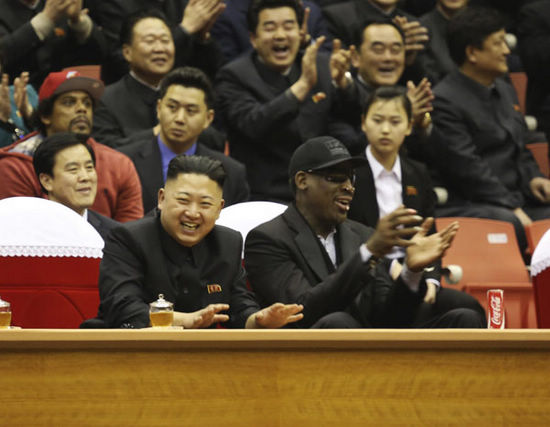 |
| DPRK's leader Kim Jong-un and former NBA star Dennis Rodman watch an exhibition basketball game in Pyongyang, February 28, 2013. (Photo/file photo) |
An American basketball delegation led by retired NBA star Dennis Rodman arrived in Pyongyang by plane on Feb. 26 and started a week-long visit to the DPRK. This visit coincides with tense relations between the two nations because of the third nuclear test in North Korea, and therefore receives much attention. The outside world cannot help speculating whether the United States is taking advantage of this opportunity to play the "basketball diplomacy" card.
After all, communication is better than refusal to talk
Zhang Liangui, professor of the International Institute for Strategic Studies under the CPC Central Committee Party School said, for a long time, North Korea regarded improving its relations with the United States as the top priority of its foreign policy, because North Korea knows that its main security threat comes from the United States. If North Korea plans to develop nuclear weapons and needs the international community to recognize its nuclear power status, the key is to gain recognition from the United States. Therefore, over the years, North Korea has been committed to establishing direct negotiations with the U.S. government in order to prompt the United States to sign a peace agreement and achieve the normalization of relations between the two sides. However, the U.S. government insisted on refusing formal intergovernmental talks before North Korea takes practical actions on abandoning its nuclear program.
In such context, North Korea has taken the strategy of adopting people-to-people diplomacy to promote formal intergovernmental communication. We saw that North Korea has consecutively invited former U.S. Presidents Jimmy Carter and Bill Clinton to visit the DPRK, and has invited U.S. former Governor of New Mexico Bill Richardson, Stanford University nuclear scientist Hawke, and famous scholar David Lewis to visit the DPRK several times. Not long ago, Google CEO Eric Schmidt was also invited to visit. This time, the invitation of the basketball delegation's visit is certainly also a part of this effort.
As North Korea's development of nuclear weapons touched upon the fundamental interests and ideas of the United States against nuclear proliferation, the U.S. government is unlikely to improve relations with North Korea, not to mention recognize its status as a nuclear power before North Korea takes real action on abandoning its nuclear program.
Therefore, even though so many Americans accepted the invitation to visit the DPRK in various identities and names, the U.S. government insisted that these people's trips to Pyongyang are purely personal behavior which has nothing to do with the U.S. government, and it is out of the question to let these people act as messengers of the U.S. government.
In fact, even if the U.S. government really has anything to say to the DPRK, there are more convenient channels. North Korea has a Permanent UN mission in New York. The two countries have already established informal channels of communication. The information exchanges between them are always smooth. Therefore, in this different era and with different background, American basketball delegation's visit to North Korea this time is unlikely comparable with the China-US "ping pong diplomacy" story in the old days.
However, communicating is better than refusing to talk. More people-to-people exchanges will enhance the mutual understanding between the people of both countries, reduce the hostility, and will have a positive impact on improving bilateral relations between the DPRK and the United States in the long run.
Read the Chinese version: 美国前篮球明星访问朝鲜—是“篮球外交”吗?; Source: People's Daily

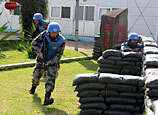

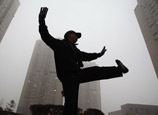

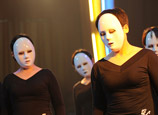


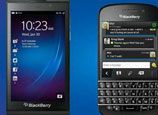







 Village teacher with his back basket
Village teacher with his back basket


![]()
